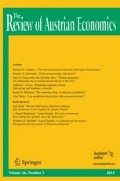Abstract
Action takes place at a given time and place. As a science of human action, economics is, therefore, just as much about the spaces where real action occurs as it is about real time. The implications of real time for social order is better recognized than the significance of “action space.” The living city is the principal locus of action space and enabler of social change as well as the source of fundamental concepts in economic theory. Just as a loss of density and diversity in cities tends to retard dynamic discovery and development, the turn in economic theory in the mid-20th century toward static equilibrium reflected a move from an urban-based to a plantation-based conception of the economy—from the city to the farm. Some recent developments in network theory, game theory, and geography, however, can be interpreted as a re-urbanization of economics.
Similar content being viewed by others
Notes
“Zipf law” is a special case of a power-law distribution and has been applied to city sizes. My conjecture is that the distribution of strangeness is probably also scale-free in the sense that we do actually see a fair number of really, really, strange people (by almost any definition of behavior or taste) in cities like New York that we do not see in small towns. If human height followed a scale-free instead of a normal distribution, we would see the occasional 50-ft, 4-ton giant person walking around.
References
Granovetter, M. S. (1973). The strength of weak ties. American Journal of Sociology, 78(6), 1360–1380.
Gratz, R. (1995). The Living City. New York: Wiley & Sons.
Hall, P. (2001). Cities in Civilization. New York: Fromm International.
Hardin, R. (2002). Trust & Trustworthiness. New York: Russell Sage.
Hayek, F. A. (1945). The use of knowledge in society. In F. A. Hayek (1948) Individualism and Economic Order. Chicago: Gateway.
Hayek, F. A. (1967). The results of human action but not of human design. In F. A. Hayek (1967). Studies in Philosophy, Politics and Economics. Chicago: University of Chicago Press.
Jacobs, J. (1961). The Death and Life of Great American Cities. New York: Vintage.
Jacobs, J. (1969). The Economy of Cities. New York: Vintage.
Jacobs, J. (2000). The Nature of Economies. New York: The Modern Library.
Krugman, P. (1996). The Self-Organizing Economy. New York: Blackwell.
Mises, Ludwig von (1963). Human Action: A Treatise on Economics. Chicago: Regnery.
O’Driscoll, G. P. Jr., & Rizzo, M. J. (1985). The economics of time and ignorance. New York: Blackwell.
Putnam, R. (2000). Bowling alone. New York: Touchstone.
Scott, J. C. (1998). Seeing like a state. New Haven: Yale Univ. Press.
Seligman, A. B. (1997). The problem of trust. Princeton: Princeton University Press.
Whyte, W. (1988). The design of spaces. In Richard T. LeGates and Frederic Stout (1996) The city reader, (2nd ed). New York: Routledge.
Acknowledgement
I would like to thank Roger Koppl and Thomas McQuade for their comments on an earlier draft. The usual caveat applies.




